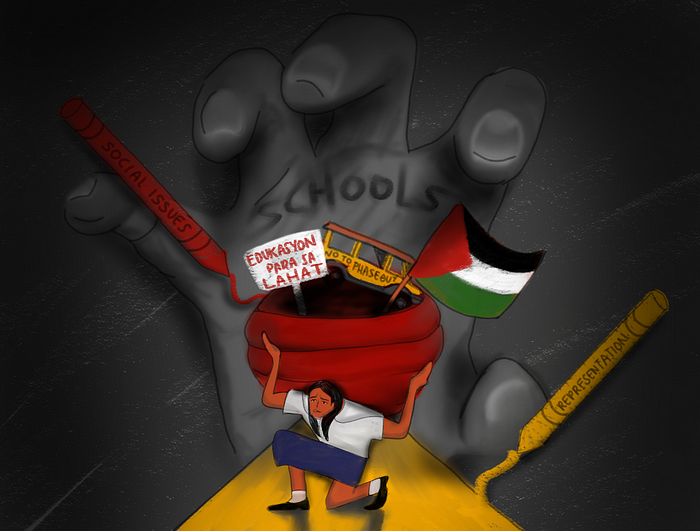Iskolar Intifada

From Manila to Ramallah, spanning the waters of the West Philippine Sea (WPS), from university campuses to streets worldwide, student movements pulsate with vigor and purpose. Across continents, students persistently raise their voices, chants, and footsteps reverberating in the struggle for justice and peace. Like the falling of stones in the mountain, their intifada will start an avalanche of change, freeing the people from all forms of injustice and oppression.
Students have significantly influenced democracy in the Philippines throughout its history. Since its early roots, student activism has invigorated calls across the political spectrum, defying perpetuated norms.
Under the authoritarian rule of Ferdinand Marcos Sr., student activists bolstered resistance against the dictatorship and ignited support from the urban poor which led to the monumental First Quarter Storm. Dissenting voices from the youth, albeit silenced, did not falter in evoking radical change that ended the corruption under Marcos, with Kabataang Makabayan, the National Union of Students in the Philippines, and the League of Filipino Students being at the forefront of the struggle.
To this day, student movements remain a driving force for progressive change in the Philippines. Mass organizations continue to lead campaigns on various fronts, from opposing budget cuts in education to advocating for climate justice and asserting national sovereignty in WPS. Their activism extends beyond student issues to encompass broader societal justice causes, standing in solidarity with marginalized groups such as women, workers, and peasants. Even amid challenges like the COVID-19 pandemic and state repression — including suspension threats from their respective schools — students persist in their commitment to social change.
The struggle for genuine social emancipation is universal.
Globally, student movements have united against pressing issues besetting the society on a larger scale. These protests demanded the divestment of the university from Israel in light of its genocide against Palestinians in Gaza. The encampments quickly spread to 140 American campuses and 80 internationally, reflecting the growing frustration over the lack of progress and concrete action amid numerous dialogues among international parties to resolve the conflict.
While the movement emerged at an unprecedented rate, the violence and repression against students were as quick to attempt to quell the flames. University administrators and state forces have conducted mass arrests and disciplinary actions such as suspensions and expulsions to suppress peaceful campus protests, which highlight a broader critique of social and economic systems that perpetuate injustices. The concentration of economic and political power exacerbates inequalities and supports a culture of hegemony. The interplay of capitalism, imperialism, and colonialism continues the very subjugation of Palestinians, prioritizing profits and geopolitical interests over human rights and justice.
Despite the repressive measures, no level of vitriol directed by authorities can curtail the spirit of militancy demonstrated by those who can no longer bear witness to their universities’ direct contribution to humanitarian injustice.
Though these student movements have sprung in different places, they emerged from the same root — the long-oppressive US imperialism. For decades, the American hegemony flaunted its strong military hold globally, being involved in multiple wars including the genocide in Palestine, supporting fascist regimes, being the top arms supplier of the world, and building military bases in around 80 countries. This manifests in the Philippines proliferation of its military bases in the Philippines through the Enhanced Defense Cooperation Agreement.
To fortify its influence in its semi-colonies, the US maintains a strong economic, cultural, and political influence. It exploits the natural resources of its colonies, may it be through the proliferation of large US mining companies in Southeast Asia and Africa, or with how the US seeks the cheap labor of the oppressed contractual workers in export-oriented countries.
The long-term exploitation of the US in different countries has prompted mass movements that aim to dismantle such an oppressive system. In the struggle, students have been rallying behind the masses to forward campaigns from the countryside to the legislative level. However, the Philippines, being an abettor of the imperialist US, unleashes its machinery to silence progressives. Elsewhere, placards are met with truncheons and shields. The attacks did not waver once.
As society grapples with persistent afflictions that compromise the lives of the basic sectors, the youth — the students, iskolars, activists — must fortify their resolve amid these challenges. Brimming with vigor and vitality, they should set the ground more firmly to overhaul the chronic ills plaguing society for so long. With the torch of activism ablaze in their hands, they need to intensify their efforts to illuminate the path toward a future society founded on principles of a classless social system, where justice and equality prevail for all.
